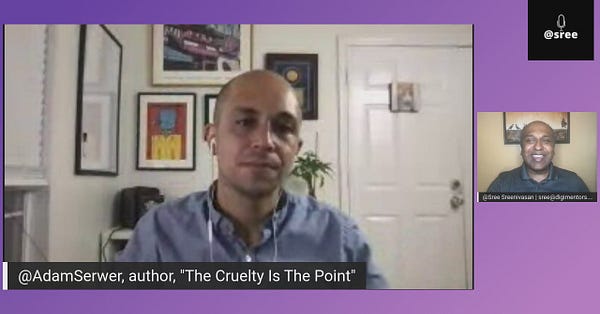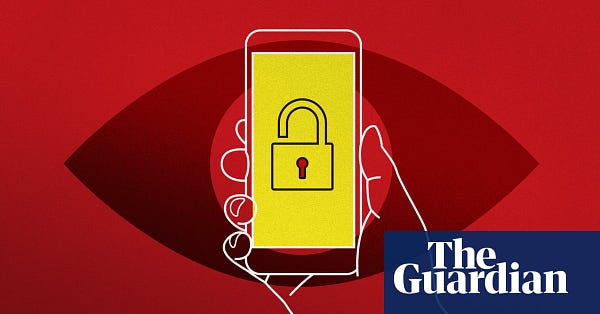The Pegasus Project and the art of investigative journalism
When news organizations really dig in, we all benefit
Sree’s newsletter is produced w/ Zach Peterson (@zachprague). Cartoon by Drew Sheneman in the Newark Star-Ledger.
Scroll down for Read Something; Watch Something; and a weekly tech tip from Robert S. Anthony (@newyorkbob).
TUNE IN: #NYTReadalong this Sunday is Neil Amdur, former NYT sports editor. Sunday, 8:30-10 am ET on my social channels. Meanwhile, see recent episodes: Shashank Bengali, NYT Live desk, former LAT South Asia bureau chief; Philip Bump, WashPost national correspondent; Margalit Fox, NYT obituaries writer; Jonathan Boorstein, writer & urban ecologist. The NYTReadalong is sponsored by Muck Rack.
My Digimentors team is working with companies and nonprofits around the world to create virtual and hybrid events. We’ve worked on events for 50 people and 100,000 people. See our new brochure. Don’t cancel or postpone your conference - contact us! sree@sree.net
***
It happens so often. There’s a huge story that should have global ramifications that seems to just not dominate the discourse like it should. The Pegasus Project is just that. Yes, there were some headlines, but with everything going on, it’s clear that over the last couple of weeks, the story has basically disappeared.
Your smartphone is a perpetual vulnerability and there’s pretty much nothing we can do about it. As such, the phones of diplomats, business executives, journalists, and activists are prime targets for people seeking information for any number of reasons, and in pursuit of an array of ends.
This is the story you should be reading, sharing, and helping people understand. Forbidden Stories and Amnesty International organized a media consortium of 17 different news organizations around the world and gave access to a trove of data from NSO Group, a private intelligence firm based in Israel. The resulting reports are stunning, and not just for the actual facts of the story.
If someone, somewhere, wants access to a certain device, it can likely be done via the private sector. And just imagine what one could do, or what one’s motives may be, for wanting to spy on anyone listed here:
Military-grade spyware licensed by an Israeli firm to governments for tracking terrorists and criminals was used in attempted and successful hacks of 37 smartphones belonging to journalists, human rights activists, business executives and two women close to murdered Saudi journalist Jamal Khashoggi, according to an investigation by The Washington Post and 16 media partners.
The phones appeared on a list of more than 50,000 numbers that are concentrated in countries known to engage in surveillance of their citizens and also known to have been clients of the Israeli firm, NSO Group, a worldwide leader in the growing and largely unregulated private spyware industry, the investigation found.
Good investigative journalism like this is an invaluable public service. In the US, smartphone penetration is 88%—pretty much everyone has a smartphone of some sort. They have our personal correspondences, banking info, and piles of other data that, if our phones were to be hacked or surveilled, could be used to severely disrupt our lives. Here’s a little guide from The Washington Post on how to minimize the risk.


It’s stories like this that should spur us to be better about our digital security, especially as our lives become so reliant on digital products and services. For some, that will happen, but most folks have moved on. It’s too bad, because this is actually a bread-and-butter issue that affects billions of people. It affects our day-to-day lives, there are far-ranging political and economical consequences, and a lot of people simply need to be more attentive to the security of the digital aspect of their lives.


Please take the time to read through the Pegasus Project, assess your digital life, and reach out to friends or loved ones who you think may be vulnerable to scams and other nefariousness in the digital world.
- Sree
Read Something
The pandemic is far from over, and I don’t think we should kid ourselves about how challenging the next 6-12 months will be. The transition to work-from-home was abrupt for those lucky enough to have that option, and lives were turned upside down in so many ways. A lot of people will go back to the office, but it’s safe to say that a significant amount of the workforce will be in the office far more sparingly than before. This will change the way businesses operate on a massive scale—so, here’s a guide from Columbia University that may come in handy.


#WorthyThread
I refuse to give up on social media because I honestly learn something (sometimes many things) every day directly because of social media. Case in point, this week I learned that the Appalachian Mountains are very very old, and the fossil record there is remarkably interesting.

Windows 365: A Windows PC in the Cloud, Available Anywhere
By Robert S. Anthony
Each week, veteran tech journalist Robert S. Anthony shares a tech tip you don’t want to miss. Follow him @newyorkbob.
Lost in the buzz around Windows 11, Microsoft’s upcoming new operating system for PCs, was last week’s announcement of another version of Windows which promises to relieve users of hardware headaches: Windows 365.
The concept of Windows 365 is simple: Instead of installing Windows on your computer, Windows becomes available from a Cloud PC which can be accessed from any device with an Internet connection and a web browser—even an Android or Apple mobile device.
The computer muscle needed to run Windows 365 and Windows applications resides in the cloud—in this case Microsoft’s vast arsenal of worldwide servers. Users don’t need a computer with a powerful processor, large amounts of computer memory or vast amounts of data storage space—the software and data stays in the cloud.
This means the Windows experience stays the same whether accessed from a home PC, work laptop, library computer or even an Apple iPad. Windows apps and settings are stored in the cloud and are available to any connected device.
According to Microsoft, the Covid-19 pandemic and the rise in all-remote and hybrid workforces sped up the development of Windows 365, which companies will be able to manage using the same tools they use to manage real PCs. Workers and home users will be able to use a full-powered Cloud PC and not need to worry about applying regular Windows updates, according to Microsoft.
Of course, cloud computing is nothing new. Corporate software which can virtualize a Windows desktop for remote users has been available for years, but often requires a professional IT staff to maintain. Chromebooks, laptops which run Google’s Chrome operating system and run most applications in the cloud, have been available since 2011.
But cloud computing for the masses is fresh ground for Microsoft, which said it would make Windows 10 (and later Windows 11) available via Windows 365, when the subscription service launches Aug. 2. Pricing for Windows 365 has yet to be announced.
Watch Something
The cruelty absolutely was and is the point of right-wing American politics, and Adam Serwer can tell you exactly why that is, what it means, and how we got here. I had him on the show last week to discuss his new book, and I think we can all learn something (many things, in fact) from Adam on this crucial issue. Also, check out my epic live-tweeting thread as I read his essential new book, “The Cruelty Is The Point: The Past, Present and Future of Trump’s America.”


Odds & Ends
🗞 TUNE IN: #NYTReadalong this Sunday is Neil Amdur, former NYT sports editor. Sunday, 8:30-10 am ET on my social channels. Meanwhile, see recent episodes: Shashank Bengali, NYT Live desk, former LAT South Asia bureau chief; Philip Bump, WashPost national correspondent; Margalit Fox, NYT obituaries writer; Jonathan Boorstein, writer & urban ecologist.
The NYTReadalong is sponsored by Muck Rack. Interested in sponsorship opportunities? Email sree@digimentors.group and neil@digimentors.group.
The Readalong is followed, on Sundays at 11 am-noon ET, by a medical show I’m co-executive producing with surgeons Sujana Chandrasekhar, M.D. (@DrSujanaENT), and Marina Kurian, M.D. (@MarinaKurian), called She’s On Call (watch live or later).
After 250 episodes in 250 days, my global show has moved from daily episodes to 1-2 times a week. The best way to know when I’m on the air and see all my archived shows, is to subscribe to my YouTube channel or my Whatsapp alerts.
The Sunday #NYTReadalong is sponsored by Muck Rack. Interested in sponsorship opportunities? Email sree@digimentors.group and neil@digimentors.group.
👀 Did we miss anything? Make a mistake? Do you have an idea for anything we’re up to? Let us know! Let’s collaborate!








